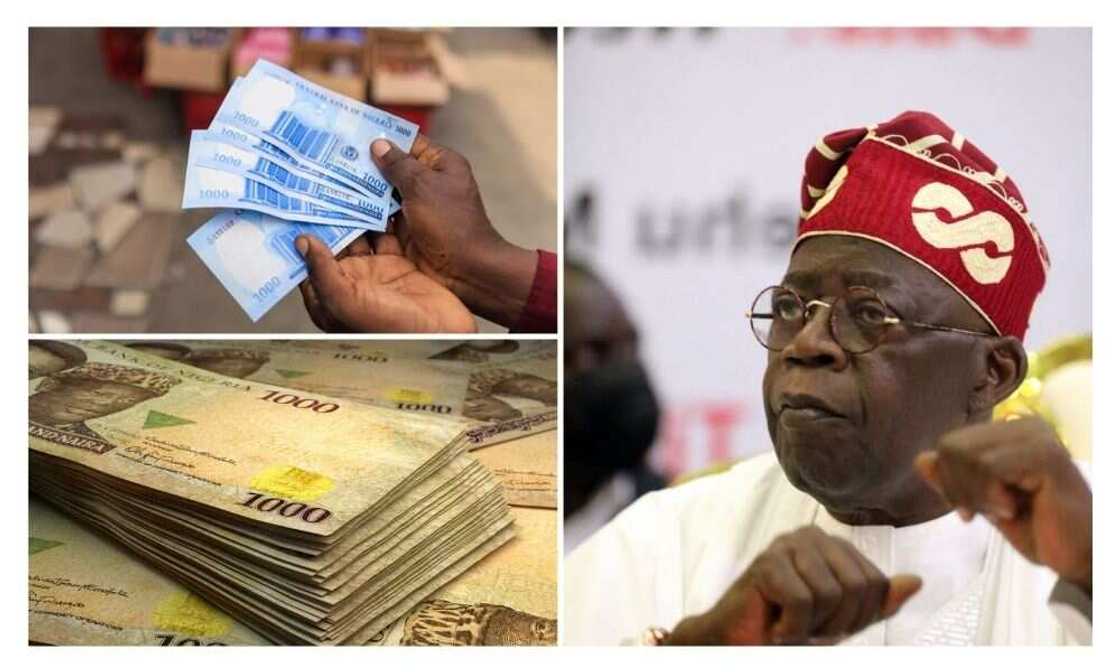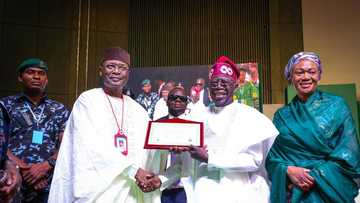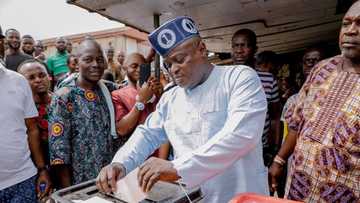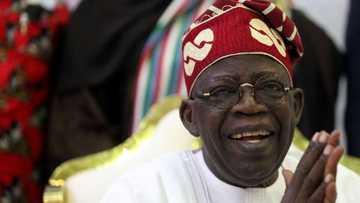Experts Predict Tinubu May Reverse CBN’s New Naira Notes Policy in His First Week in Office
- Experts believe Tinubu would reverse the new naira policy of the CBN in his first week in office
- They advised him to tweak the policy to eliminate bottlenecks and friction around it
- According to them, the policy will curb several problems, including corruption
PAY ATTENTION: See you at Legit.ng Media Literacy Webinar! Register for free now!
Bola Ahmed Tinubu is Nigeria's President-Elect following the pronouncement by Nigeria's Independent Electoral Commission (INEC) on Wednesday, March 1, 2023.
Tinubu reportedly scored the majority votes and met the 25% constitutional requirement to be declared the winner of the tightest election in Nigeria's history.

Source: Getty Images
During the heated campaign season, the Nigerian government, via the Central Bank of Nigeria (CBN), embarked on a cashless policy aimed at reining in cash outside the banking system in Nigeria.
On October 26, 2022, CBN announced it was embarking on a currency redesign project and stated that Nigeria's top three banknotes would undergo makeovers.

Read also
2023: Ohanaeze Ndigbo finally reacts to presidential election results, sends strong message to UN, others
PAY ATTENTION: Сheck out news that is picked exactly for YOU ➡️ find the “Recommended for you” block on the home page and enjoy!
Specifically, CBN announced that N200, N500, and N1,000 notes would be redesigned before December 15, 2022, to curb several monetary and economic challenges, which include ransom payment, counterfeiting, and surplus cash in circulation.
Some, especially political parties and candidates, saw CBN's decision as punitive and against their ambitions.
Bola Tinubu repeatedly repudiated the policy in most of his campaign speeches.
Also, many governors, namely Governors El-Rufai of Kaduna and Ganduje of Kano, lampooned the move.
Experts have said that based on pre-election rhetorics, Tinubu would dismantle the new naira policy in his first week in office primarily because he sees it as anti-people and anti-growth.
Financial expert and journalist with Anadolu Agency, Charles Ike, said Tinubu would not spend a day in Aso Rock before dismantling the policy.
Ike said Tinubu sees the policy as designed to frustrate his presidential ambition and eventual emergence as Nigeria's next president.
He said:
"Now that INEC has declared him the winner, it will be his top priority. He won't spare the policy and its proponents. I am very sure because he has never liked it."
Ike said he did not see anything wrong with the policy but that it was poorly managed and executed.
"I will advise Tinubu to rework the policy. It is a good one but needs tweaking. It will curb corruption and bring more revenue to the federal government," Ike said.
Bamidele Ogunaike, a former banker, said that the erstwhile Lagos State governor saw the naira redesign policy as his interest and ambition and would not wait a minute in Aso Rock before scrapping it.
Ogunaike advised the President-elect to rethink the policy in such a way that it eliminates the bottlenecks and friction that characterise it.
Ogunaike said:
"Tinubu believes he is a people man and sees the policy as against the masses. As much as he hates the policy, I will tell him to let it stay and maybe reform it."
He stated that CBN means well with the policy but needed to prepare to execute it.
5 reasons CBN’s naira redesign policy has been unsuccessful
Legit.ng reported that the Nigerian Economic Summit Group (NESG) had highlighted some reasons for the less-than-commendable success rate of the Naira redesign and swap policy recently initiated by the Central Bank of Nigeria.
The NESG noted this in its recent report titled, NAIRA REDESIGN POLICY: CAUGHT IN THE WEB, released in February 2023, where it analysed the Central Bank of Nigeria (CBN)'s intent for the policy, the issues that have emanated, and the likely outcome of a prolonged cash crunch.
The private policy advocacy group stated that the CBN's plan to redesign the country's currency which is authorised by Section 18(a) and (b) of the CBN Act of 2007, could not have come at a worse time when Nigeria was already dealing with biting fuel scarcity, inflation and other economic woes.
Source: Legit.ng




